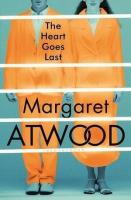
The Heart Goes Last takes place somewhere in the near future, after a catastrophic economic crash. Most people are unemployed. Many are homeless. Young married couple Stan and Charmaine are reduced to living in their car, barely surviving on the money Charmaine makes at her waitressing job. Things are desperately bleak and seem unlikely to improve at any point in the future, which is why Stan and Charmaine sign up without much hesitation for a new social experiment: The Positron Project offers the guarantee of a job and a place to live; the catch, however, is that all residents must spend alternating months in prison. Oh yeah, and they must give up any semblance of privacy. And they can never leave. It's an outlandish set-up, and things only get wackier when Charmaine and Stan both become obsessed with their "alternates," the people who live in their house on the in-between months when they are in prison. Somehow lifelike sex robots, a troupe of gay Elvis impersonators, and an experimental new brain surgery that purports to guarantee that your beloved is yours for life all enter the mix.
On one hand, the set-up and plot of the novel is downright farcical. Fun and entertaining, yes, but deeply silly. (It's the lighter side of dystopia.) On the other hand, through the preposterous premise Atwood manages to explore the ethics of investigative journalism, the death penalty, what it's acceptable to do to make a buck, the nature of love, and the balance between freedom and security. It is a novel that is both ridiculous and deeply serious at the same time, which is perhaps the major problem here. Atwood writes beautiful sentences, she knows how to craft a compelling story, and her razor-sharp sense of humor is definitely on display. If the reader ignores her attempts to address deeper issues, however, then the novel just seems ridiculous and inconsequential. The treatment of the more serious issues is, however, never deeply fleshed-out and any consideration of significant questions is almost always immediately undercut by some ever-more-farcical plot twist. In the end, I closed the book thinking that I had been entertained, but I wasn't convinced that all of the novel's diffuse elements worked together.
This is not Atwood's first venture into dystopian territory. Readers should also check out her far superior novels The Handmaid's Tale, Oryx and Crake, The Year of the Flood, and MaddAddam. For similarly themed dystopian novels, readers may also want to try Gold Fame Citrus by Claire Vaye Watkins, On Such a Full Sea by Chang-Rae Lee, or California by Edan Lepucki.
